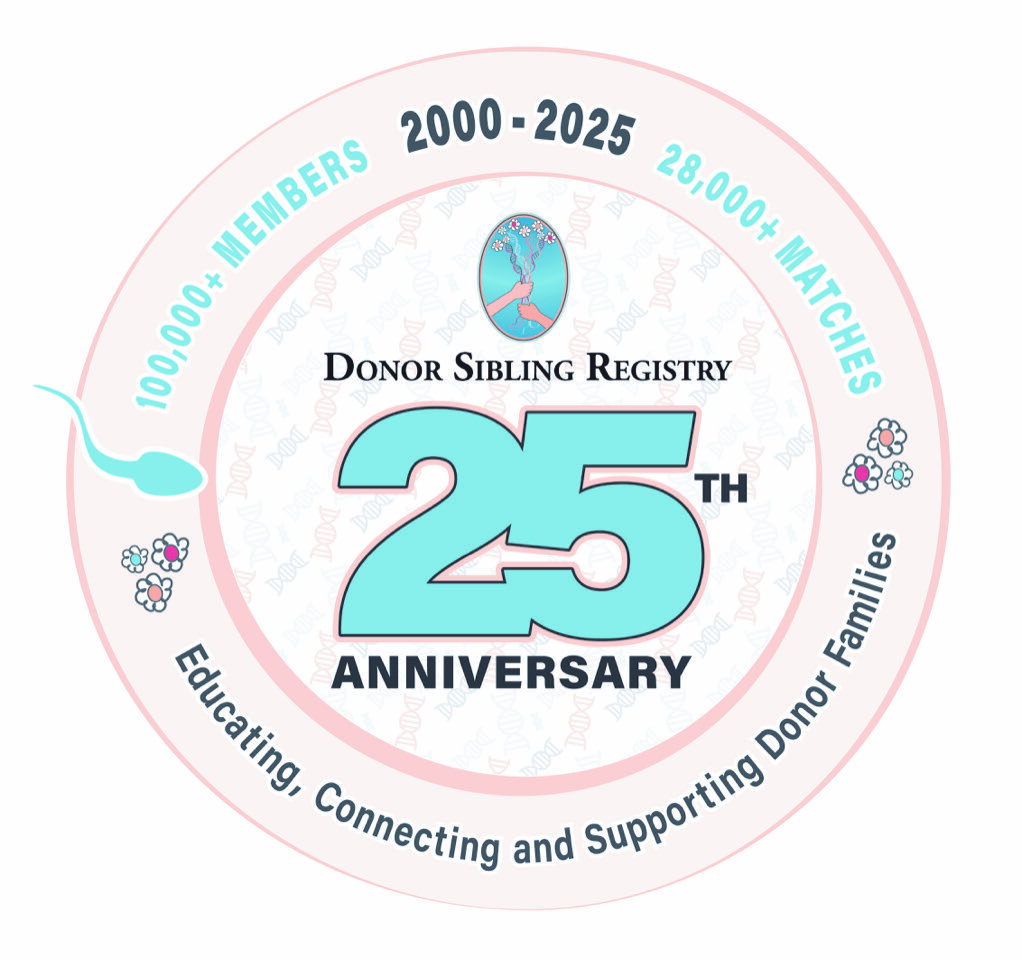History and Mission
The Donor Sibling Registry (DSR) was founded in 2000 to assist individuals conceived as a result of sperm, egg, or embryo donation who are seeking to make mutually desired contact with others with whom they share genetic ties. Donor siblings, donor offspring, parents of half-siblings, biological parents: all donor family connections. Without any outside support, the DSR has pioneered an international discussion about the donor conception industry and donor families, through research, media appearances, speaking engagements, and interviews. The DSR advocates for the right to honesty and transparency for donor-conceived people, promotes social acceptance and legal rights, and values the diversity of all families.
Nowhere in history, anywhere around the globe, has a society deemed it in a child's best interests to be kept from their close genetic relatives, family medical history, and ancestry, for the first 18 years of life.

Sperm Banks: Educating and counseling prospective parents and donors about the Donor Sibling Registry is important. It's an idea whose time has come.
The donor conception industry is largely a for-profit enterprise. After the “product” has been purchased, most doctors, clinics, egg donation agencies, and cryobanks do not engage in discussions or activities that acknowledge the humanity and rights of the donor-conceived people.
Parents are sometimes unprepared for their children's curiosity and desire to know more about their genetic background. To move out of the secrecy and shame that has for so long shrouded donor conception, the DSR will continue to educate parents and the general public on the importance of honoring and supporting children's natural drive to know more about their identity.
The DSR works hard to ensure that donor-conceived people have a safe place to search for their biological identities and make these connections with their half-siblings/donors. When matching on the DSR, ask for a few pieces of information from the donor profile that have not been posted and that only the donor or someone with the donor's profile would know.
It might be hard to understand the value of the DSR if you've never used our website to connect with your own or your child's genetic relatives or if you've never had an urgent medical issue to share with your donor family. Or if you've never been notified of an urgent medical issue that warranted medical screenings or preventative medicine. Or if you've not yet created life-long relationships with a group of people that you or your child is related to, including donors- right from pregnancy or birth. There is now an entire generation of donor-conceived people who have been able to grow up knowing their half-siblings and biological parents.
We send adult donor-conceived people (DCP) to the DNA sites all the time. But think about it: if all parents were educated about the importance of connecting right from the start, many of those people would have had the opportunity to grow up knowing their half-siblings and biological parents instead of having to wait until they were adults to try and find each other via other methods. Same for donors- if they were properly educated, more would connect earlier on the DSR with families.
Too many facilities instill fears about parents wanting money, donors wanting to parent, or donor-conceived people looking for an active parent, in attempts to keep these folks from connecting. Too many DCP ask their parents, “If I could have grown up knowing my half-siblings (and donor) why didn’t you let me?” All too often, fear is the reason.
Sperm banks could consider what is in the best interests of the children they're helping to create and properly educate prospective donors and parents about the importance of connecting early on (not waiting 18 years). Dozens of egg facilities write the DSR into their donor-parent agreements, allowing parents and donors to connect right from pregnancy/birth. Sperm banks could do the same. It would just take one to get the ball rolling in the right direction.
Looking Ahead: Our Goals for 2026

Continue to educate mental health and reproductive medicine professionals about the need for adequate counseling for all donor family members.

Continue facilitating donor family connections.

Further expand media coverage of the donor-conceived community's issues.

Initiate and continue academic partnerships for research.

Continue outreach programs to the reproductive medicine industry, universities, legal organizations, LGBTQ organizations, mental health professionals, and the public.

Reach the milestones of 105,000 DSR members and 29,000 people matched.

Continue to encourage oversight and regulation of the infertility industry.

We will continue to think and dialog deeply, rigorously, and critically about how to move this industry forward more ethically and responsibly — considering the needs and rights of all stakeholders, but most importantly the needs and rights of donor-conceived people.
Testimonials




 Browse by Clinic
Browse by Clinic
 Become a Member
Become a Member



 Read less
Read less